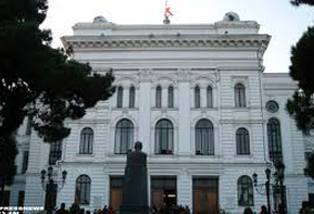Sopo Getsadze
With the initiative of the Ministry of Education Tbilisi University of Economic Relations and Georgian Economy and Law University joined the Tbilisi Ivane Javakhishvili State University. The representatives of the abolished universalities said the purpose of the unification was better mobilization of the state funds and increase of the education level.
After the unification, people doubted that students would not be able to continue learning at the same faculty. Their fear had enough grounds because those three universities had different faculties. For example, Tbilisi State University does not have tourism faculty while the Tbilisi University of Economic Relation had it. We asked the TSU administration to explain whether the students of similar faculties will face any problems and have to change the faculty.
“As a result of the unification, the different educational programs automatically became the part of the TSU education program; so, the tourist faculty will become part of our educational process and they will continue functioning without any delays,” said the head of the quality management department at the TSU Nino Durglishvili.
There is one more problem – students studied different subjects at the same faculties in different universities. Now, they will have to study different subjects and they might have to add some tuition fee and one more term in the TSU.
The Human Rights Center tried to find out the situation but could not get clarification of the abovementioned problems. “The process of program accreditation means that similar programs are not essentially different and students are unlikely to pay additional fees or spend more time on education,” the Human Rights Center was clarified at the TSU.
The Tbilisi Economy and Law University found a solution of the problem – the students will learn optional subjects alongside compulsory ones. So, they will be able to choose different subjects themselves.
We inquired the fate of the professors and lecturers after we somehow found out the situation about students. The head of the quality management department of the Tbilisi State University said that they announce competitions for academician personnel at different times and TSU lecturers also have to take part in these competitions as a rule. “The academician personnel, who want to join the TSU, should participate in the competition first.”
The fate of the rectors of the abolished universities is unclear. Although they lost their positions, they positively evaluate the unification process.
“I think, more exchange programs will be implemented in the TSU and students will have more opportunities. In several years, our borders will open, we will join EU and unless we make our education system adequate to the European standards, we will face problems,” said the former rector of the Tbilisi University of Economic Relations Avtandil Chutlashvili.
Most part of students condemns the unification of the universities and blames the administrations in breaching their rights.
Giorgi Chukhua: “I do not like the unification because I liked the system of the Tbilisi University of Economic Relations. I entered that university because of that system and now they have transferred us to the TSU without warning us in advance. I do not like that fact at all. I did not plan it and nobody cared about our opinions.”
Tinatin Revazishvili: “I respect the Javakhishvili State University and I know it is nice institution because they are still very famous and maintain their old traditions. But I liked the discipline and educational program of my university. I liked everything here and our transfer creates some problems for us. For example, I am undergraduate student and there are some formalities which create obstacles for me now.”
Tornike Mdivnishvili: “This decision has two sides – positive and negative. The positive is – we will have new opportunities; as the TSU rector told us during the meeting, they will offer many exchange projects to us. TSU has more funds than our university had. As for the negative one, I think, there was family environment there unlike TSU. Guram Tavartkiladze did his best to create similar environment in the university. However, it was gradually fading away and now I appreciate the unification process.”
Mariam Kevkhishvili: “I will have to learn many different subjects at the TSU and I doubt we will have to learn one more term. We have not received exact answer on that question yet.”
And finally, of course, we requested public information about the unification process from the Ministry of Education. After two-week unsuccessful expectation, we found out that the officials of the Ministry are too busy to answer our questions.
News
December 13, 2023
Ethnic minorities outside the peace dialogue
November 6, 2023
‘Peace’ agenda of political parties
Popular
Articles
February 13, 2024




